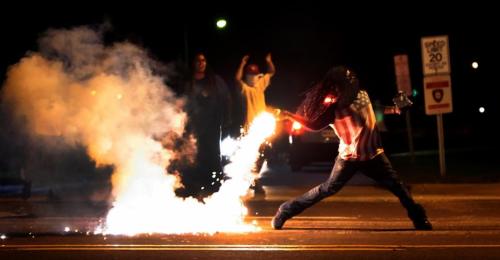https://thepreachersword.com/2014/11/25/an-alternative-response-to-ferguson/
An Alternative Response to Ferguson
Last night Norma Jean and I watched the events unfold in Ferguson, Missouri. We live on the other side of the state, 237 miles away, but it seemed like it was happening in our back yard.
Following three months of hearing witnesses and evaluating evidence, Prosecutor Bob McCullough announced the Grand Jury’s decision not to indict officer Darren Wilson in the shooting death of Michael Brown.
Columnist Cal Thomas correctly predicted, “There will be two responses to this: one emotional, the other legal.” Very soon we witnessed both. Attorneys and talking heads were dissecting the decision and discussing the legalities of the issue.
While Michael Brown’s family issued a statement of disappointment, they called for peaceful protests. In part, they said, “answering violence with violence is not the appropriate response.” Regrettably their call for calm was ignored.
While there were peaceful protests, a fringe element of thugs and opportunists took advantage of the situation to riot and steal. I awoke this morning to learn that 25 separate fires were set, 12 businesses were burned down and many stores were looted and damaged.
As I reflect on the chaos in our country, may I suggest a third response–A spiritual response. For those of us who call Jesus our Lord and Savior, let us be careful not to engage in unkind emotional responses, ugly epitaphs or unfair stereotypes. Let me suggest three spiritual responses
(1) Lift up your voice in prayer. More than ever our country is hurting. Violence, crime and sin are filling our land. There is division, discord and disrespect from many quarters. We need to pray for peace. Paul’s exhortation has never been more appropriate.
“Therefore I exhort first of all that supplications, prayers, intercessions, and giving of thanks be made for all men, for kings and all who are in authority, that we may lead a quiet and peaceable life in all godliness and reverence.” (1 Tim. 2:1-3)
(2) Be a peacemaker. Preachers, pastors, religious leaders and all Christians need to “pursue the things which make for peace” (Rom 14:19). Jesus said, “blessed are the peacemakers.” James wrote, “Now the fruit of righteousness is sown in peace by those who make peace” (Jas. 3:18)
Our attitudes, actions and words should promote peace. Encourage peace. Advance peace. Be wary of those who rub emotions raw, inflame anger and incite rebellion.
(3) Practice the second great commandment. Jesus said the first and great commandment is to “love the Lord your God with all your heart, with all your soul, and with all your mind. And the second is like it: ‘You shall love your neighbor as yourself.’” (Matt 22:37-39)
God loves all people. Regardless of our social standing, economic status or political persuasion, God loves us. Color, race, or ethnicity does not affect God’s love, mercy and grace for all of us. Our attitude should emulate that of our heavenly Father.
This morning Jeneé Osterheldt wrote in the Kansas City Star, “I understand that the jury has spoken. And it wasn’t exactly what many people wanted to hear. But we cannot heal through riots. We cannot heal through white fear or black outrage or the big blue badge of aggression.”
“We have to see beyond the bad. Not all protesters are looters. Not all white people are racist. Not all black people are thugs. Not all cops are bad. We’re all humans, and we must come together and create change.”
In the final analysis, our greatest problems are not political, social or racial. They are spiritual. When God’s Word is disregarded, and principles of righteousness are ignored, there will be lawlessness, discord and human suffering. The admonition of our 30th President, Calvin Coolidge, is especially appropriate today:
“We do not need more material development, we need more spiritual development. We do not need more intellectual power, we need more moral power. We do not need more knowledge, we need more character. We do not need more government, we need more culture. We do not need more law, we need more religion. We do not need more of the things that are seen, we need more of the things that are unseen.”
–Ken Weliever, The Preacherman

